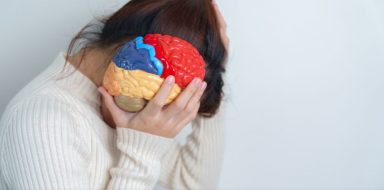ADHD and Depression
Whether you do or do not have ADHD, chances are you are going to feel depressed at some point in your life. For some people, ADHD and depression go hand in hand.
Unfortunately, coping with ADHD can cause depression, especially when treatment is unsuccessful. According to the National Comorbidity Survey Replication study, the prevalence of major depressive disorder in adults with ADHD was 18.6%.
Even if you do not have ADHD, an estimated 17.3 million adults in the U.S, have at least one major depressive episode per year. This article will explore how you can treat both disorders when they are comorbid, meaning when they occur at the same time.
What is ADHD?
Attention deficit hyperactive disorder (ADHD) is a mental disorder. It affects your attention span, mood, and actions. Over 6 million people have it in the U.S. alone.
Common symptoms of ADHD include:
- Restlessness
- Unintentional social blunders
- Inefficient time management
- Impulsiveness
- Easily getting distracted
- Sensory overload
- Poor social skills
With ADHD there are good days and bad days. It can be depressing to watch yourself fail, as if your success is beyond your control. You may feel that you are disappointing yourself and others, which makes it so much worse.
Adults and children with ADHD are often victims of unintentional social blunders. They will unintentionally say or do something that damages their social relationships, and bridges can burn fast when you have ADHD and do not receive treatment.
Not only can this make someone with ADHD lonely, it can also leave them crippled financially, or worse.
What is Depression?
Depression is a mood disorder. Unlike temporary sadness, depression is more severe and lasts longer.
Common symptoms of depression include:
- Loss of interest in daily life
- Hopelessness
- Trouble paying attention and concentrating
- Fatigue
- Feelings of worthlessness or guilt
- Weight loss or gain
- Excessive sleep or insomnia
- Thoughts of suicide
- Irritability and impulsivity
What Causes Depression?
Anything can cause depression; there is no single cause. Certain factors can contribute to depression. Two of the biggest contributing factors in cases of depression are family history and medical conditions:
- Family history: Healthcare providers always ask about your family's medical history because it matters. If someone in your family has depression, you are at higher risk of having it yourself.
- Medical conditions: Some medical conditions increase your risk of depression. ADHD is one of them. People with ADHD are more likely to have mood disorders in general.
- Medications: Certain medications do increase your risk of depression. However, ADHD medication does not.
- Trauma: This depends on the individual. Trauma for one person could be normal for another. An example is moving to a new home, going to jail, losing all your money in the stock market, or someone dear to you passing away.
Many people find diet can play a key role in ADHD symptom management. Discover what the best and worst foods for ADHD are here.
What Are the Types of Depression?
There are several types of depression. The two most common types are situational depression and major depressive disorder (MDD).
Situational Depression
This is a temporary mental state a person experiences when struggling to accept a traumatic life change. Recovery begins when an individual accepts their new life circumstances. Usually does not last longer than two weeks.
Major Depressive Disorder
MDD is more severe, or major, than situational depression. If a mental state of depression lasts longer than two weeks, it might become major depression.
How is Comorbid ADHD and Depression Treated?
Treat any substance or alcohol use disorder before beginning treatment. Otherwise safety of the patient and effectiveness of the treatment are at risk.
Do You Treat ADHD or Depression First?
In the past, doctors would treat mood disorders before treating ADHD. Today this is not the case.
A recent study identified about 2,000 people with comorbid major depression/ADHD and compared them with about 2,000 people with major depression only. People with comorbid major depression/ADHD were 232% more likely to be resistant to anti-depressants. The study found individuals receiving regular treatment for ADHD had a much lower risk for anti-depressant treatment resistance.
Based on the results of the study, treating ADHD before depression is highly recommended. It is not recommended to attempt treating both at once. Cases of severe depression are more likely to be treated before ADHD. Your care provider will decide what is best.
How is ADHD Medication Used When Comorbid Depression is Present?
The treatment of comorbid ADHD and depression with ADHD medication has not been studied on a large scale.
The effects of Ritalin (methylphenidate) were studied over 12 weeks in ADHD patients who had symptoms of depression. None of the patients had enough symptoms to meet the criteria for a diagnosis.
The study found a reduction in ADHD and depressive symptoms. This means stimulant medication may be a suitable treatment for ADHD and mild cases of depression.
How Are Anti-Depressants Used When ADHD is Present?
Some anti-depressants can help treat ADHD and depression. However, anti-depressants only reduce hyperactive and impulsive symptoms, not inattentive symptoms.
As for depression, anti-depressants are effective at improving symptoms within six to eight weeks. The more severe the depression, the greater the improvement.
One study compared depression in adult patients taking anti-depressants and those taking a placebo.
Adults with moderate or severe depression showed:
- With placebo: 20 to 40 out of 100 people noticed an improvement in their symptoms within six to eight weeks.
- With anti-depressants: 40 to 60 out of 100 people noticed an improvement in their symptoms within six to eight weeks.
Adults with moderate or severe depression showed:
- With placebo: 20 to 40 out of 100 people noticed an improvement in their symptoms within six to eight weeks.
- With anti-depressants: 40 to 60 out of 100 people noticed an improvement in their symptoms within six to eight weeks.
A Combination of Therapy and Medication
ADHD is traditionally treated with therapy. Serious cases of depression may require therapy as well. Cases of situational depression usually do not require therapy. Cognitive behavior therapy (CBT) can be used to treat both disorders. It is unclear how effective CBT is when the disorders are comorbid.
An analysis of comorbid treatments showed a combination of anti-depressants and CBT improved symptoms. Fluoxetine was the anti-depressant used together with CBT. Adolescents with severe and chronic depression saw the most improvement from a combination of CBT and fluoxetine. Other patients in the study who were treated using either only CBT or only fluoxetine had less improvement.
The results indicate combined CBT and fluoxetine can treat comorbid depression and ADHD.
Don’t Wait for Treatment
Exercise and a healthy diet can improve ADHD and depression symptoms. Those are two things you can take action on today.
If you or someone you know feels depressed and have no idea how to get treatment, call the SAMHSA (Substance Abuse and Mental Health Services Administration) at 1 800-662-4357.
Their service is free, confidential, and available 24/7. They will refer you to a treatment specialist so you can begin treatment.







